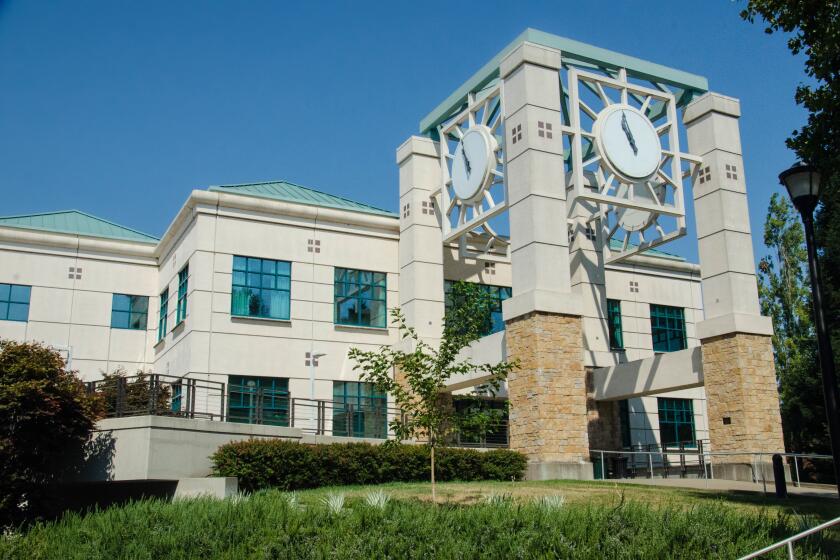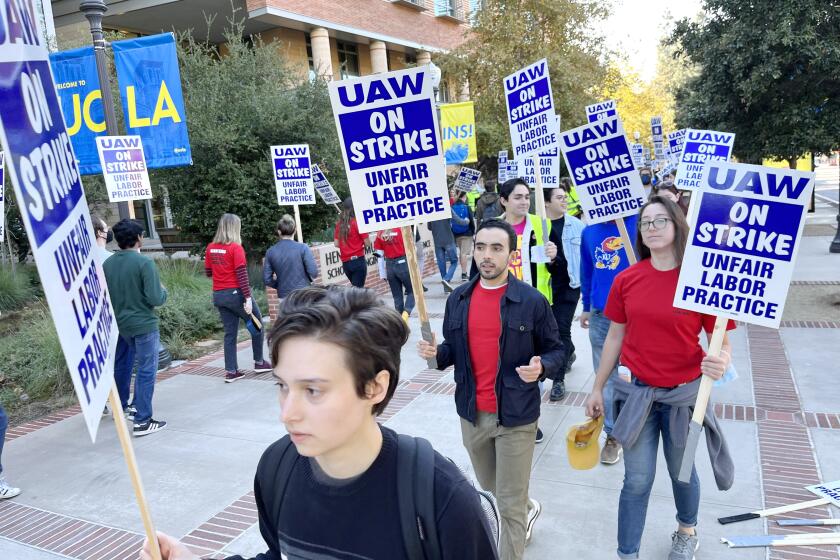Law Banning ‘Timeouts’ Is Under Fire : Education: Problem students in special schools can no longer be removed from class to cool off. Many are sent out of state, at taxpayer expense.
A little-known law that went into effect last year could double the number of special education students transferred from Orange County schools to private out-of-state programs, and create a costly new burden for local taxpayers, education officials say.
The 1993 law, known as the Hughes Act, prohibits schools from using “timeouts”--a period during which students are removed from the classroom and placed alone in a room while they regain their composure after a conflict--for special education students.
According to Larry Belkin, director of the county Department of Education’s special schools unit, four students from county school districts have been sent out of state this year as a direct result of the Hughes Act, which was approved by the Legislature last year. Belkin predicts that number will increase substantially as more districts become aware of the law.
“It took more than a year for information about the law to get out to school districts,” Belkin said. “When we check with teachers and other school officials, it’s amazing how many of them don’t know about the law. As more become aware, we expect to see more students referred to out-of-state” schools.
Students with severe emotional problems will be most directly affected by the new law. These students often exhibit behavior that includes hurting themselves and others.
Private schools which contract with districts to handle such special education students are not exempt from the law. Belkin fears that once those schools become aware they can no longer use timeouts to control behavior, they may be reluctant to accept local students with behavior problems.
Barbara Rossier, director of the private Rossier School in Garden Grove, which accepts special education students from Orange and Los Angeles counties, said she has referred at least five students this year to residential, out-of-state facilities because of the timeout prohibition. She said she believes several other students may soon follow.
“I am seeing kids go (to residential facilities) who shouldn’t have to go,” Rossier said. “I have had to refer more kids out in the last year (because of the Hughes Act) than I ever had to before.”
But not every school is interpreting the law so strictly. Dick Schnetzer, coordinator for business services for Mardan School of Educational Therapy, a private school in Irvine that contracts with many Orange County school districts, said the Hughes Act would have no impact on his facility’s selection of students.
“There is nothing in the regulations prohibiting timeouts,” Schnetzer said.
Ironically, the bill does not prohibit a tactic that many special education advocates say is much more intrusive than a timeout: the prone containment, which allows up to four adults to physically restrain a student laying flat on the ground.
“I do not allow prone containment,” Rossier said. “I find it very incongruent that that is permitted while timeouts, which if done properly can be very positive, are not allowed.”
Rossier defended timeouts as a dignified way for students to regain control of their behavior.
“There are occasions when it is therapeutic for students to have privacy to gather themselves up,” Rossier said. “That has been removed in the Hughes bill.”
Introduced by state Sen. Teresa Hughes (D-Inglewood), the bill originally called for a study of how special education students are disciplined.
Belkin and other education officials agree that the bill was needed to address some cases of abuse by teachers against special education students. “The idea of the Hughes bill was to look at both bad and good practices and develop regulations to implement the good practices statewide,” Belkin said.
One highly publicized case involved an Orange County boy who was killed in 1987 while at Gill Education Center, a county special education school. Fourteen-year-old Barth Pico died when a teacher attempted to stop an outburst by the retarded boy by rolling him up in a mat used for physical education.
But shortly after the bill passed and before the study was completed, the state Commission on Special Education, at the request of the state Department of Education, asked special education administrators, including Belkin, to write regulations that would be used to implement the law.
“We had a big problem with the regulations,” Belkin said. “Some of the language in the bill was ambiguous, and there were discrepancies. We were trying to write (regulations) for things that weren’t clear.”
Sending students to out-of-state facilities is far more expensive than educating them locally. The schools, generally located in Utah, Texas and Arizona, can charge as much as $200,000 per year for some students. School districts pay 30% of the bill, with the state picking up the rest.
Belkin said 30 county students are currently in out-of-state residential facilities, at a cost of about $2 million. But that figure does not include the cost of housing students or treating psychiatric problems they may have.
Belkin and other special education administrators are concerned about how the regulations are being interpreted by schools, special education advocates and parents of special education students.
The law mandates that a student’s “physical freedom” be assured. Belkin and others on the regulation committee took that to mean that a student could not be placed in a locked room or restrained by straps or other devices.
But some officials with the state education department say the law prohibits any type of restraint.
“What the Hughes Act says is that you have got to develop a plan if you even suspect a child is capable of violent behavior, before that behavior occurs,” said Allan Simmons, manager of the special education division of the state education department. “School is a positive learning situation and even the very bizarre behavior can be controlled in a positive way.”
Under the law, teachers may use physical restraint when a student exhibits spontaneous, unpredictable behavior that presents a clear and present danger to the student or other students, but only the first time a student becomes dangerous.
Once that has happened, teachers must develop a behavior intervention plan that may not include timeouts for future outbursts, according to several education officials.
Dennis Kreil, director of the Northeast Orange County Special Education Local Plan Area (SELPA) said he is concerned about the potential for students now placed in local facilities, public or private, to be referred back to the district because of the Hughes Act regulations.
Students placed in such facilities, Kreil said, are generally those with the most profound behavior problems.
“We wouldn’t send kids to the county if we had the appropriate place for them here,” Kreil said. “These kids are very challenging.”
Jim Hemsley, director of the West Orange County SELPA, said some of the 15 students from his area currently placed in county or local private schools may have to be sent out of state if the regulations are interpreted to mean that no form of timeout is permitted.
“If those schools had to strictly adhere to that interpretation, they would need another setting” that allowed timeouts, Hemsley said.
More to Read
Start your day right
Sign up for Essential California for news, features and recommendations from the L.A. Times and beyond in your inbox six days a week.
You may occasionally receive promotional content from the Los Angeles Times.






